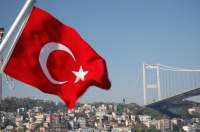Türkiye Threat
Thursday, October 24, 2024
Written by Laurence F Sanford, Senior Analyst ASCF
Categories: ASCF Articles

Türkiye (formerly known as Turkey) is a threat. Not only is Türkiye a threat to Christian Europe and the U.S., but it is also a threat to neighboring Islamic countries.
President Recep Tayyip Erdogan has transformed Türkiye from a secular government into an Islamist one. His goal is to resurrect the Ottoman Empire's caliphate and claim worldwide leadership of the Muslim community. Since beginning his reign in 2002, Erdogan has purged secularists from the government and military, built thousands of mosques throughout the world, and inserted Islamic doctrine into the education system.
Erdogan became prime minister after serving as mayor of Istanbul. During his mayoral tenure, he was thrown in jail for four months for reciting an Islamic poem that incited racial hatred:
The mosques are our barracks
The domes our helmets
The minarets our bayonets
And the faithful our soldiers
Between 2006 and 2009, 9,000 mosques were built in addition to the 75,000 existing mosques for a nation of 80 million; this translates to one mosque per 1000 citizens. Most of the new mosques were designed in the style of the 16th-century Ottoman Empire when the empire was at its peak.
The Ottoman Empire ended after World War I when Türkiye was on the losing German side. The victors, France and Great Britain, dismantled the Ottoman Empire and established the nation-states of Syria, Lebanon, and Iraq. During this period, millions of Armenians, Greeks, and Assyrians were killed by the Turkish military in the first genocide of the 20th century.
Mustafa Kemal Ataturk, a Turkish field marshal and political leader, became president in 1923 after leading the resistance against Allied efforts to partition Türkiye. He abolished the Islamic caliphate and began secularizing society from Islamic rule. Ataturk was President until he died in 1938; he modernized Türkiye into a secular, industrial, nationalistic nation with women achieving equality and making primary education free, secular, and compulsory.
Erdogan, on the other hand, wants education to forge a “pious generation” that will work for the construction of a new Islamic civilization. His speeches have emphasized Türkiye’s Ottoman history and domestic achievements over Western ideas. The government is rapidly expanding religious education throughout the country and spends twice the amount of money per student in religious schools versus mainstream schools.
Western Europe is increasingly concerned about Erdogan’s progressively autocratic rule. He survived a 2016 coup against his rule, which was perhaps one of the worst-planned coups in history. It has been suggested that Erdogan himself planned the coup so enemies could be identified and eliminated (similar to China’s “Hundred Flowers Campaign, where Chairman Mao allowed criticism of communist rule. Once the critics surfaced and were identified, they were jailed, killed, or ostracized.) Following Mao’s
example, Erdogan has jailed thousands of journalists, soldiers, and regime opponents. Türkiye has jailed more journalists than any other country in the world.
U.S., NATO and the European Union (EU) relations with Türkiye are complicated:
1. Türkiye has over one million Syrian refugees, which Erdogan has threatened to “open the gates” for them to enter Europe and swamp social networks. Muslim immigrants do not integrate into Christian societies as witnessed by “no go” Muslim ghettos.”
2. Türkiye held up Sweden’s entry into NATO over Sweden’s stance on freedom for Kurdish refugees and Quran protests.
3. Türkiye threatened fellow NATO member Greece over Greek-controlled islands near the Turkish coast. Türkiye’s military seized and now controls one-third of the island of Cyprus.
4. Türkiye welcomes Hamas and other Islamic terror groups. Relations with Israel have deteriorated, with both countries recalling their ambassadors.
5. Türkiye is calling for a two-state solution to the Palestinian problem yet is silent on establishing a Kurdish state.
6. Türkiye employs state-funded Muslim imams in foreign mosques to influence Turkish residents in foreign countries.
7. Türkiye is accused of bribery against Mayor Adams of New York City to gain influence in political matters.
8. Türkiye is improving relations with Iran and North Korea at the expense of the West. Sanctions imposed on Iran are being bypassed through Türkiye.
9. Türkiye downplays ISIS-K threats, endangering European and American security.
10. Türkiye bought Russian missile systems despite being a member of NATO.
Summary
Erdogan is an Islamist and ideologically opposed to Christian Western democracy. The central tenet of Islam is world domination. His rise through Turkish politics now has him as the autocratic ruler of Türkiye marching toward the Islamic caliphate. He famously said, “Democracy is like a tram. You ride it until you arrive at your destination, then you step off.” Erdogan stepped off, and the tram fell into a ravine.
The Ottoman Empire that Erdogan wants to resurrect once controlled most of the Middle East and North Africa. In Europe, modern-day Greece, Bulgaria, Romania, and parts of Russia and the Balkans were under the Empire’s rule. In 1683, the Turks were repulsed from the gates of Vienna, Austria, by combined forces of the Holy Roman Empire, Hungary, and Poland. This marked the beginning of Turkish decline as Western nations grew militarily and economically.
Ironically, the West grew because of the Ottoman conquest of Constantinople in 1453. Land trade routes to the East via the Silk Road were choked off by the Ottomans. West European countries were forced to find new trade routes to the East via the ocean. Hence, Portuguese, Dutch, and Spanish ships sailed the world, bringing wealth and the discovery of the Americas.
Action
Reciprocity should be the foundation of American foreign policy. And the philosophy of the “enemy of my enemy is my friend” should be followed.
● Ban the building of foreign mosques in the U.S.
● Support Israel and Ukraine against totalitarian enemies.
● Recognize the West is at war with Marxism and Islamism.
● Increase the U.S. defense budget and support industrial complexes.
● We win, they lose!
Peace Through Strength!











